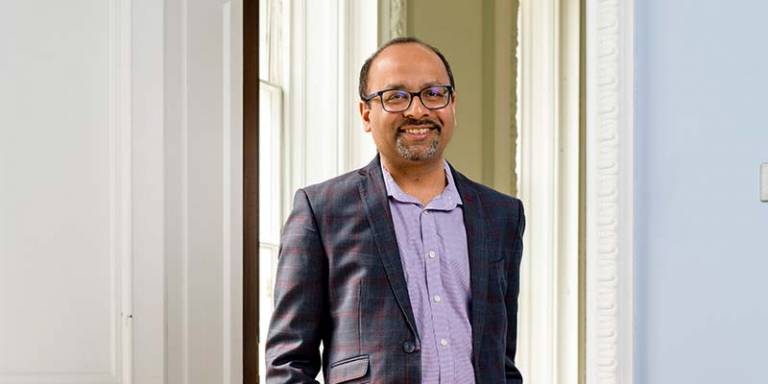Bringing research and policy together with Hetan Shah
1 June 2022
Chief Executive of the British Academy and member of the inaugural UCL Policy Lab Advisory Council, Hetan Shah discusses the changing ways research can engage the public on key policy issues.

This interview originally appeared in the UCL Policy Lab magazine.
Hetan Shah has spent the last two years insisting to anyone who will listen that academics can make a major contribution to the world’s recovery from the Covid-19 pandemic. Through commentaries in prestigious journals like Nature, to one-to-one briefings with leading politicians and civil servants, Shah has become one of the world’s leading advocates for the transformative power of research in the humanities and social sciences.
But even he is under no illusions about how difficult it can be to bridge the gap between academia and public policy.
“The UK is blessed with a lot of thoughtful experts at universities,” he says, but “we have lost some impetus in recent years about bringing research to the table about the big social issues.” There is “deep expertise” and “a lot of thinking,” but making the fruits of that work available to people at large has rarely been a political priority. Although colleagues in the natural sciences have been rightly celebrated for their huge strides in vaccine technologies, for example, the benefits of social science have been less widely acknowledged. “Perhaps one of the questions for the future is how we make evidence available in a way that latches onto political priorities and interests,” he suggests.
Shah does, however, see signs of hope. “Younger researchers coming through the system now think of public engagement and policy engagement much earlier, in a way that wasn’t traditional in the past.” And this is precisely where an initiative like the UCL Policy Lab can come in. “Institutions that are brokers are critical,” he explains. “It’s not just about having stellar academic credentials, wonderful though that is. It’s about having these institutions creating spaces that bring policymakers and researchers together on the issues of the day. They must build relationships which can then be maintained on an ongoing basis.”
He is convinced that the kinds of conversations that take place when these relationships are brokered will be transformative. “The levelling up agenda has often thought about place,” he explains. But through debate and discussion, you see that it can also be about “groups and individuals.” He goes on to say that “poverty in London is probably as high as anywhere else in the country, so how do we make sure that we level up not just in terms of geography? Even within areas traditionally perceived as richer, we can ensure everybody has the best possible start in life.” These are the questions that can emerge when researchers and the community come together.
It is this spirit of collaboration that gives Shah the most profound hope for the future. A way forward has been demonstrated by “the powerful role that civil society played during the pandemic,” Shah says. “We can and are building upon that. The fact that it wasn’t just the government that helped people through the pandemic — we were all supporting each other, whether that was through community groups or charities — shows the way forward for our society and for public policy as well.”
Hetan Chah is Chief Executive of the British Academy and a member of the UCL Policy Lab Advisory Council
 Close
Close

